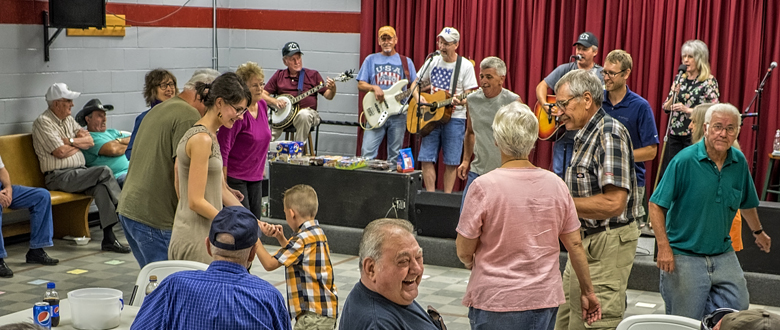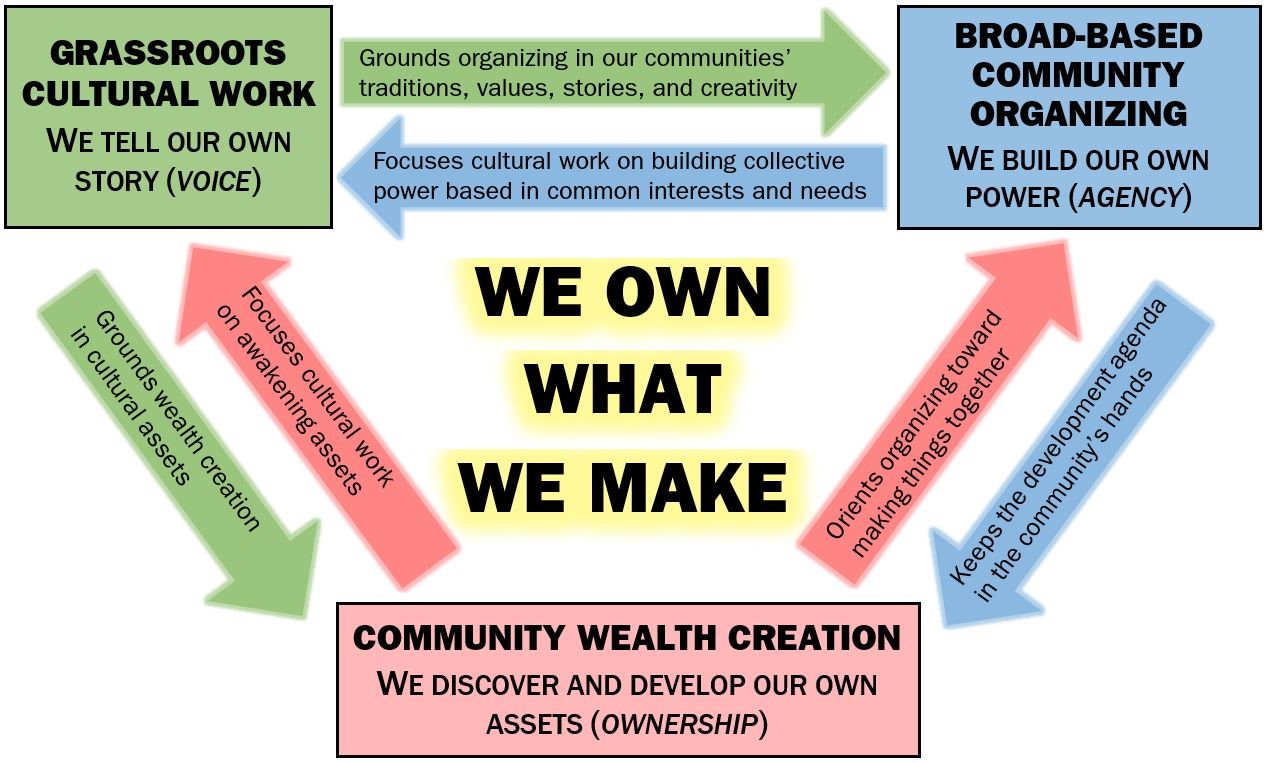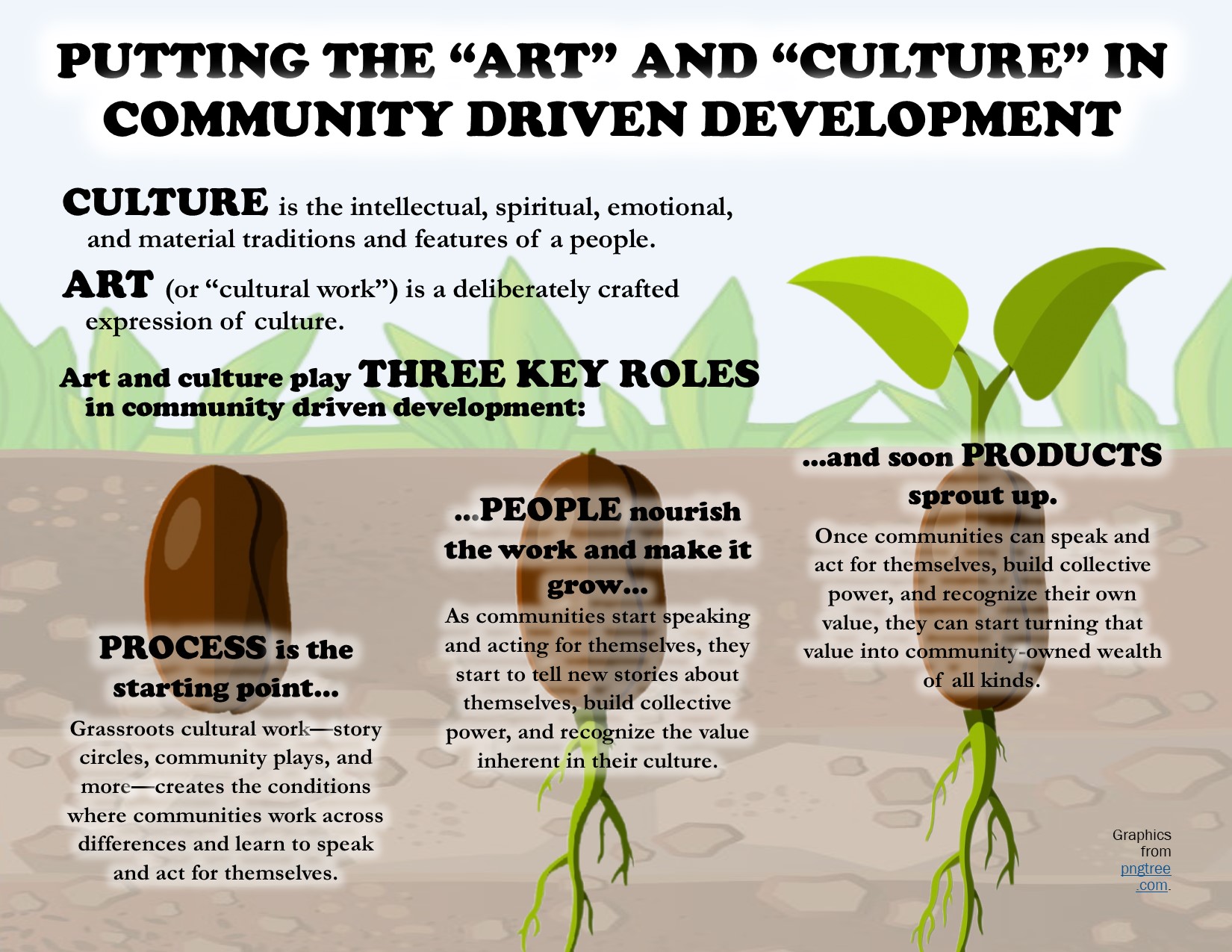“Saving the Cultural Legacy of the Mission”: Preventing Cultural Displacement in San Francisco’s Mission District
By Francis Yu and Jeremy Liu

The Para la Mission mural located on 19th Street and Mission Street, shortly after artist Mel Waters repaired damages from vandalism. (Francis Yu 2018)
A jarring splash of white paint defaced an iconic community mural after it was vandalized by an unknown suspect late in mid-July 2018. The mural, named Para la Mission, displays guitarist Carlos Santana, a native of the Mission District, centered within a backdrop of Latinx iconography. The Mission District of San Francisco — a historically Latinx neighborhood where, for decades, murals have served as a representation of a rich cultural legacy — has contended with the pressures of gentrification for almost two decades now. This vandalism is just one reflection of a dynamic, but sometimes contested, relationship between arts and cultural identity in a changing neighborhood.
Through arts and culture, communities can explore shared understandings of identity, values, beliefs and heritage. As cities all over the nation grapple with rapid change and development pressures, arts and culture can also provide an equitable approach to guiding growth. In other words, a cultural lens helps to answer the question, “How can cultural equity contribute to planning and development in a just, fair, and inclusive way?”’
Increasingly, community development organizations (in sectors such as affordable housing, economic and workforce development, health, etc) are collaborating with arts and cultural institutions and individual artists to more comprehensively address community issues, like displacement and health inequities. The field of creative placemaking — and the reframing of the field towards the values of “placekeeping” — amplifies how arts and culture help to preserving community identity and belonging as physical spaces are transformed. In San Francisco, Mission Economic Development Agency (MEDA), a long-standing economic development organization focusing on the needs of the Mission’s residents, and Galería de la Raza, a major cultural and arts anchor in the Mission, have been working as strategic partners to comprehensively address issues of cultural and physical displacement. Through a grant from The Kresge Foundation and with assistance from PolicyLink, they have identified a shared understanding that belonging is not just about physically living in a neighborhood, but is also about the cultural identity of a place. They have been working together to understand how arts and culture contribute to the work of equitable housing and economic development, have identified anti-displacement strategies around this understanding, and are in the process of shaping broader policy goals for their partnership.
Often considered ground zero for gentrification in San Francisco, rents in the Mission continue to rise and restaurants and services catering to more affluent populations have taken over local ‘mom and pops’ establishments servicing the neighborhood’s Latinx communities. These communities include Mexicans, Guatemalans, Nicaraguans, El Salvadorians, and more — all foundational to the Mission’s cultural identity. Murals, such as the recently-defaced Para la Mission, adorn many of their walls, sometimes filling entire alleys with pieces from local arts organizations and artists. Yet, many of these community murals are disappearing, and in one case, painted over with a different mural reflecting the tastes of new ownership.
Near the end of 2016, MEDA started exploring strategies on how to protect the Mission’s culture and culture bearers, with initial conversations centering on creative placemaking. Ani Rivera, director of Galería de la Raza, offered a critical voice to that conversation and pointed to the framing of “placekeeping” as “respecting the legacy of the community.”
“We have the culture and we have the artists. How do we preserve that?” Rivera recalls asking in her initial discussions with MEDA. MEDA has preserved or created 1,173 affordable units through their Community Real Estate program, with a laudable goal of creating 2,000 units by 2020. These units have been vital to ensuring the sustained presence of long-time Mission residents and families in the neighborhood. But the relationship with Galería de la Raza has opened them up to other opportunities. The two partners decided to relocate Galería de la Raza into a new space in one of MEDA’s new affordable housing developments. Together, they have crafted a real estate strategy that takes advantage of the City of San Francisco’s Small Sites Program to prevent the displacement of the local artistic community. The program offers loans for nonprofits seeking to acquire four- to 25-unit buildings in order to keep them permanently affordable. By intentionally seeking out spaces where local artists reside, this secures that they will continue to have an influence on the culture and cultural expression of the neighborhood.
“Saving the buildings was more than just saving the units or creating below market rate opportunities, it was saving the cultural legacy of the Mission,” says Rivera.

Ani Rivera and the team at Galería de la Raza prepare for the opening of the Comida Es Medicina show at Studio 24 located on 24th Street and Bryant Street. (Francis Yu 2018)
“PolicyLink served as a provocateur — a point of inspiration to challenge the work that was going on, to look beyond arts as a space issue,” says Feliciano Vera of MEDA. Both organizations also benefited from being connected to other cohort members from the Arts, Culture, and Equitable Development initiative. Throughout the grant period, which ends this month, they connected with other cohort members experiencing similar issues within their communities, such as gentrification, cultural erasure, or a drastically changing economic landscape. Events like cohort convenings and the 2018 PolicyLink Equity Summit helped the cohort form a support network of organizations addressing various community development challenges through the lens of arts and culture.
The full integration of an arts and culture lens to these strategies, or a “Culture-in-All-Policies” approach, akin to the “Health-in-All-Policies” movement, can provide a comprehensive approach recognizing the Mission’s cultural legacy in areas such as housing, education, immigration, and others. “When we think of the Mission and community development [we need to] understand the critical role that arts and culture play in facilitating and sustaining community for seven generations forward and seven generations back,” said Rivera referring to the importance of a holistic approach to community development. Work to bring “Culture-in-All-Policies” into the San Francisco Latino Parity and Equity Coalition's policy agenda is ongoing and permeating the collaboration between the two organizations in other ways as well.
Earlier this year, working with PolicyLink, Galería de la Raza and MEDA hosted an informal meeting with a coalition of Mission activists to explore the way arts and culture approaches or considerations could support their fight against planned bus-only lanes on a major thoroughfare in the neighborhood. Equity issues raised by the activists included how private shuttles, i.e. “Google buses”, would be allowed to use the lanes, prioritizing the transport of newer, wealthier residents through the Mission over benefiting Mission residents themselves.
In the meeting, participants were led through a visioning exercise where they were asked to recall or envision the most positive way transit was a part of the life of the neighborhood. Later, as discussions of strategy where being debated, a MEDA policy staffer realized that they, as a community, had overlooked the cultural arguments for reversing the bus-only lane decision. She shared how meaningful bus stops had been to her to meet and connect with neighbors, and that the elimination of bus stops in the Mission to streamline service on the bus-only lanes would disrupt a vital cultural function. The coalition realized once more that one of their most important assets — their cultural identity — could be used in advocacy and organizing. The campaign to change the bus-only lanes continues, but the collaborative work of Galería de la Raza and MEDA to integrate arts and culture into equitable development continues.
Kentucky Communities Unlock their Cultural Wealth to Lead the Way Forward
By Abbie Langston and Lorrie Chang

Photo Credit: Malcolm Wilson, Humans of Central Appalachia
Letcher County, Kentucky is at the very heart of Appalachia, a region as rich in history and culture as in natural resources. Over the last 10 years, the county has lost more than 90 percent of coal jobs that had sustained its economy. About 98 percent of residents are White and 80 percent voted for Donald Trump in 2016.
At first glance, this rural area might seem to have little in common with diverse urban centers like Detroit and Pittsburgh. But the challenge of advancing a just economic transition in coal country is not dissimilar with the challenge of building an equitable economy in metropolitan regions once dominated by steel, automotive, or other manufacturing sectors.
Like these cities and other “company towns,” Eastern Kentucky citizens once drew their lifeblood from a single industry, and now face the challenge of charting a new economy. One resident likened coal’s hold to addiction. The coal companies proclaimed, “you mine the coal and we’ll take care of you,” she explained. When coal collapsed, this dependency left communities in fear and desperation. So it’s no surprise that many residents have welcomed the prospect of a proposed federal prison as another economic anchor to fill the void.
But across the political spectrum, a consensus is building that Letcher County’s future cannot depend solely on one company or industry. A group of community-led organizations have formed the Letcher County Culture Hub, a network designed to foster and develop residents’s agency and assets, and build on the strength of its own rich cultural wealth. Today the growing list of partners include volunteer fire departments, businesses, community centers, and artist and cultural organizations collaborating with elected officials and other local, regional, and national organizations. Partners bring together resources and work in consensus to pursue common goals including reviving cultural events like the region’s bluegrass festival, founding new social enterprises including one that employs formerly incarcerated people, and expanding opportunity such as broadband Internet.
The Letcher County Culture Hub is also a part of the Arts, Culture, Equitable Development Initiative, generously supported by The Kresge Foundation, for PolicyLink to expand the impact of six community based organizations across the US in equitable development and policy change through arts and culture.
Centering Grassroots Power: Self-Determination through Arts and Culture
The Letcher County Culture Hub was born out of Appalshop, a 50-year-old multimedia arts, culture, and workforce development center that supports residents to tell their own stories, strengthen Appalachian culture, and work for more just communities.
With its arts-and-culture focused mission and deep roots in Letcher County, Appalshop took a unique approach to economic development: unlike traditional development that begin with a plan for a community to develop assets, they began with the community and the assets within it. Ben Fink, an Appalshop organizer who collaborated with community leaders to start the Culture Hub, explained, “This isn’t a project about saving Appalachia. This is a project about Appalachians saving ourselves.” From this perspective, culture isn’t just a way to add local flavor to economic development or market products; it is the very context and medium that make economic and social relationships possible. As Fink put it, “culture means more than music, dance, or art. It means paying attention to the language, interactions, and how meaning gets made.”
For the Culture Hub, starting with culture means starting with the methodology of story circles utilized by Appalshop’s longtime collaborator Junebug Productions, an African-American arts organization rooted in the civil rights movement. Story circles create a space where all voices are equal, identify and build on common bonds, and generate ideas from the intersections and contradictions between stories.
This has been a crucial process for the Culture Hub whose constituents span a wide spectrum of philosophical beliefs and political leanings. Fire chief, former mine owner, and conservative political activist Bill Meade reflected, “If you told me I would be here at Appalshop three years ago, I would have never believed you.” Appalshop has long been viewed by some with skepticism for its progressive political orientation in a place steeped in conservative traditions. But by building from the common ground of culture, the Culture Hub has bridged long-standing divides and forged new bonds of collaboration. Story circles, community plays, and other cultural-based approaches have allowed participants to not ignore their differences, but to work across them through shared values and aspirations. Meade, a founding member, is now one of the network’s central leaders. He has played an integral role in economic development, helping launch the county’s first large-scale solar project with partners; and the arts, playing a lead role in Appalshop’s recent play The Future of Letcher County.
Playing the Long Game: Rooting Culture in an Economic Model
For over a hundred years, Appalachia has been dominated by an economic model that suffocates rather than encourages creativity, new ideas, and self-determination. The Culture Hub’s vision for the next hundred years is very different: build a culture of entrepreneurial spirit, interdependence, and unbounded imagination among residents who believe the future is theirs to create. This is why their mission is not just job creation or economic development. Instead, it is guided by the broader principle, “We own what me make.” The goal isn’t to employ everyone; but to create the conditions for everyone to enact their cultural, civic, and economic agency; identify and build on their assets; and find self-directed ways to turn them into community wealth.

The Culture Hub is playing the long game to redefine who owns and designs the narratives, strategies, and policies that will define Appalachia’s economic transition. Policies or programs alone cannot achieve true equity — a society in which all can reach their full potential — without shifting the culture of how people relate and make meaning and value together.
By building trust and a common voice through the intentional, collective production of culture, participants recognize and act on opportunities and needs in ways that might not be possible in traditional planning processes. As Fink explained, “honestly I think there was some shame about, you know, feeling helpless…[These deeper opportunities and needs weren’t] going to come up but for the kind of really intentional work around relationship building and strengthening that we did.” Because the Culture Hub roots development in people and their stories, participants are able to “not only to tell a different story about themselves, but also to act on that story”. Residents can rewrite their story from helpless to empowered and shape the solutions that turn this story into reality.

The Culture Hub is expanding. What began in 2015 with four partners is now nearly 20. Furthermore, the Culture Hub joined community cultural organizations in the Black Belt of Alabama, Mississippi Delta, West Baltimore, and rural and urban Wisconsin to found an emerging coalition. This project, called Performing Our Future, brings grassroots partners alongside economists, researchers, and technology developers together to advance community-led, culture-driven development on a national and international scale. The Culture Hub and the coalition continue to look for collaborators and funding to support work in which all people, voices, and perspectives make their own future and own what they make.
Support the Green New Deal
This is how "Winning on Equity" happens!
Last Thursday, New York Congresswoman Alexandria Ocasio-Cortez and Massachusetts Senator Ed Markey demonstrated the meaning of radical imagination by putting forward a legislative framework to confront climate change and uplift the lives and well-being of Indigenous communities and communities on the front lines of climate threats across the nation. Their proposed Green New Deal (GND) builds on work many of you have led over the last decade: it confronts the threats of climate change by proposing a transition from fossil fuels while investing in the communities and the 100 million economically insecure people in America that have borne the worst of our carbon-based economy.
Let's show Congress that the Green New Deal has our support. Transformative solidarity is the prerequisite to realizing the promise of the Green New Deal vision.
Contact your congressional leaders and tell them to cosponsor the Green New Deal framework and move it forward into bold legislation.
Highlights of the Green New Deal include:
- Universal Access to Clean Water and Transportation: The GND prioritizes investment in green infrastructure including drinking water, wastewater, and stormwater infrastructure that can ensure universal access to clean water for the 77 million people across the U.S. who lack access to safe and affordable drinking water. It would dismantle fossil fuel infrastructure to protect our natural water systems, while developing renewable energy sources. It would eliminate greenhouse gas emissions from transportation, and would repair and improve our transportation, energy, housing, and other infrastructure.
- A Federal Job Guarantee in the Green Economy: Amid growing economic insecurity and persistent racial economic inequity, a federal job guarantee can be a cornerstone for an inclusive, thriving, and sustainable 21st century American economy. By ensuring that every person who wants to work has access to a quality job, a job guarantee would eliminate involuntary unemployment, decrease poverty, and raise the floor on low-wage work while building stronger, more climate-friendly communities. The GND explicitly addresses historic, social, economic, racial, and gender-based injustices and includes a federal job guarantee as well as additional policies that ensure economic security and build wealth and ownership at the community level.
Climate change and growing inequality are among the greatest threats to our nation. As the nation's population becomes majority people of color, the Green New Deal can enable us to become a just, fair, and sustainable society where all — including working-class communities and communities of color long locked out of opportunity — can participate, prosper, and reach their full potential.
Tell your congressional representatives to support the Green New Deal by cosponsoring the bill, moving forward committee hearings, and shaping bold legislation.
In solidarity,
Michael McAfee, PolicyLink
